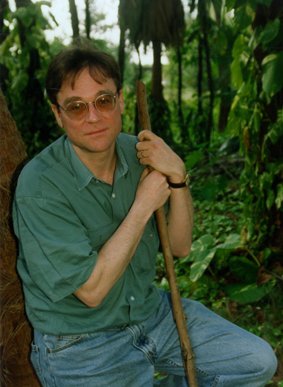
|
P
A T R I C K
O ' L
E A R Y (excerpted from Locus Magazine, September 1999) | ||
 Photo by Beth Gwinn |
Patrick O'Leary was born September 13, 1952 in Saginaw, Michigan. He got a B.A. in journalism from Wayne State University, then ''decided I didn't want to be a journalist. Hung around for a while after that, then got into advertising.'' In the mid-'70s, he became a copy intern at one of the major Detroit agencies, and began working on the Chevrolet account. ''I've been there ever since – one of the few people in advertising who hasn't hopped from agency to agency. I've worked on Chevrolet all my career. Now I'm a senior VP.'' He was first published as a poet, then sold some non-genre stories. Although his first novel, Door Number Three, appeared in 1995, followed by The Gift in 1997, he started working on those books considerably earlier. He married Claire Varieur in 1977; they have two teenage sons. He just finished his third novel, The Impossible Bird. |
|
|
''It was a great thrill, when I had published my first book and finally discovered fandom, to meet other people as weird as me, people who took this SF stuff seriously and understood what a brilliant writer Philip K. Dick was – that it wasn't just him getting really high and typing. I was a reader, sort of the isolated fan. I grew up loving Asimov, Le Guin, Philip K. Dick, the only person I knew who did. Nobody took science fiction seriously, when I was reading it. They were too religious, or too snooty literary. They'd say, 'Such embarrassing covers! Please don't bring them around.' So I got condescension from my academic friends in the '70s, and I got it from other people who thought it was all Star Wars stuff or comic book stuff. Actually, I was a huge comic book fan too, Marvel comics, so I think I slid very naturally into the fantastic in literature. ''I started writing The Gift in 1974 (finished it about '94!). I'd been reading Tolkien for a couple of years, and I'd been heavily influenced by Ursula Le Guin's 'Earthsea' books. The Gift I call science-fantasy. It's set on an Earth that has been invaded by aliens. The book never comes out and says that as such, but if you pay attention, you realize that is what has gone on. The myth of The Gift is that aliens left us the gift of storytelling. They fooled with our makeup and created a being that was capable of telling stories. That's the background. You could read The Gift entirely and not get that, and it wouldn't matter a bit. But it's a meditation on storytelling, and I've wondered for years why stories are so important to us as human beings. ''I think the narrative impulse is hardwired into the human being. Some people might say that's the impulse to create meaning in an essentially meaningless reality, to capture some order out of chaos. I suspect it's something else. You have to question further, go deeper, and say 'Why do we desire meaning?' Certainly, stories give us meaning. They order things, give us beginning, middle, and end. Stories console, they provoke, they tell truth, they challenge us. My opinion is that it implies there's some intelligence in the universe. Maybe we're the pinnacles of evolution – God help us if we are. (Or help God. 'You could've done better, buddy!') But I suspect there's an intelligence in the universe, and it's being expressed in these strange creatures who like baseball, and fall in love, and hurt each other, and incidentally tell stories. ''Door Number Three is my first published novel. (I didn't finish The Gift until years later.) It's a contemporary science fiction story. My problem with describing my books is, I try to write books that are indescribable. If you try to describe them, they sort of crumble. You could say Door Number Three is a time travel, psychoanalytic, Jungian, comedy, apocalyptic, blissful meditation on the notion of forgiveness and enemies, but you haven't said anything once you've said that! ''Door Number Three is like Philip K. Dick, where the actual fabric of reality is called into question. That's what I love about science fiction – it takes nothing for granted. It says not just 'what if?' but 'Why not?' Why couldn't the universe be a construction of some alien mind? Or, what if God is something we incarnate in our own lives, and He doesn't exist outside of that? – that tendency to ask big questions, and to question the apparently solid assumptions of our culture, is what attracts me to science fiction, because I believe a great deal of what we take for granted is bullshit. Science fiction says, 'Now wait a second. There's more going on.' Philip K. Dick sounds like a man who didn't take anything for granted, and that's a method I use in a lot of my books. They're full of unreliable narrators, people who are not what they seem to be. ''So I'm starting to write a book about hummingbirds. The Impossible Birds is science fiction about an alien invasion, takes place in contemporary times. Part of what started the story for me was the idea, What if aliens came to Earth and we were not the creature they were most interested in? What if they didn't recognize us as the most evolved species on the planet? Why do we assume they would? In my book, they invade Earth but they pretty much deal with hummingbirds. They don't have much to do with us.'' |
| © 1999 by Locus Publications. All rights reserved. |

